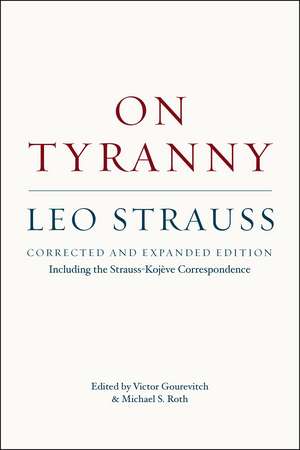On Tyranny: Corrected and Expanded Edition, Including the Strauss-Kojève Correspondence
Autor Leo Strauss Editat de Victor Gourevitch, Michael S. Rothen Limba Engleză Paperback – 13 sep 2013
On Tyranny is Leo Strauss’s classic reading of Xenophon’s dialogue Hiero, or Tyrannicus, in which the tyrant Hiero and the poet Simonides discuss the advantages and disadvantages of exercising tyranny. Included are a translation of the dialogue from its original Greek, a critique of Strauss’s commentary by the French philosopher Alexandre Kojève, and the complete correspondence between the two.
This revised and expanded edition introduces important corrections throughout and expands Strauss’s restatement of his position in light of Kojève’s commentary to bring it into conformity with the text as it was originally published in France.
Preț: 200.97 lei
Nou
Puncte Express: 301
Preț estimativ în valută:
38.46€ • 40.25$ • 32.01£
38.46€ • 40.25$ • 32.01£
Carte disponibilă
Livrare economică 10-24 martie
Livrare express 21-27 februarie pentru 28.28 lei
Preluare comenzi: 021 569.72.76
Specificații
ISBN-13: 9780226030135
ISBN-10: 022603013X
Pagini: 358
Ilustrații: 2 halftones
Dimensiuni: 152 x 229 x 23 mm
Greutate: 0.48 kg
Editura: University of Chicago Press
Colecția University of Chicago Press
ISBN-10: 022603013X
Pagini: 358
Ilustrații: 2 halftones
Dimensiuni: 152 x 229 x 23 mm
Greutate: 0.48 kg
Editura: University of Chicago Press
Colecția University of Chicago Press
Notă biografică
Leo Strauss (1899–1973) was one of the preeminent political philosophers of the twentieth century. He is the author of many books, among them The Political Philosophy of Hobbes, Natural Right and History,and Spinoza’s Critique of Religion, all published by the University of Chicago Press. Victor Gourevitch is the William Griffin Professor of Philosophy Emeritus at Wesleyan University. Michael S. Roth is the president of Wesleyan University and the author of several books, including Memory, Trauma, and History.
Recenzii
“On Tyranny is a complex and stimulating book with its ‘parallel dialogue’ made all the more striking since both participants take such unusual, highly provocative positions and so force readers to face substantial problems in what are often wholly unfamiliar, even shocking ways.”
